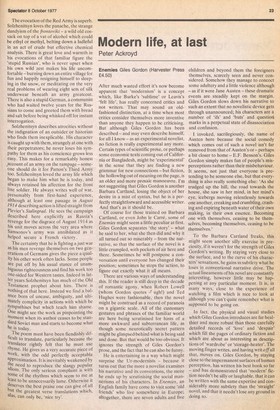Modern life, at last
Peter Ackroyd
Enemies Giles Gordon (Harvester Press £4.50) After much wasted effort it's now become apparent that 'modernism' is a concept which, like Burke's 'sublime' or Leavis's 'felt life', has really concerned critics and not writers. That may sound an oldfashioned distinction, at a time when most critics consider themselves more inventive than anyone they happen to be criticising. But although Giles Gordon has been described and may even describe himself, for all 1 know as an experimental novelist, no fiction is really experimental any more. Certain types of scientific prose, or perhaps some economic texts coming out of California or Bangladesh, might be 'experimental' in the sense that they are finding a new grammar for new connections but fiction, the hollowing out of meaning on the page, is an older and more prosaic manoeuvre. I'm not suggesting that Giles Gordon is another Barbara Cartland, losing the object of her desire in a mist of syntax, but he is a perfectly straightforward and accessible writer. And that's as it should be.
Of course for those trained on Barbara Cartland, or even John le Cart* some of Enemies might seem a little peculiar at first. Giles Gordon separates 'the story' what he said to her, what she then did and why it all turned out so miserably from the narrative, so that the surface of the novel is a little crumpled, with pockets of air here and there. Sometimes he will postpone a conversation until everyone has changed their position; sometimes he stops the action, to figure out exactly what it all means.
There are various ways of understanding this. If the reader is still deep in the decade of romantic agony, when Robert Lowell (whom Gordon quotes ugh!) and Ted Hughes were fashionable, then the novel might be construed as a record of paranoia on a gigantic scale. All of the customary gestures and phrases of the 'familiar world are here being scrutinised for hints of a more awkward and subterranean life, as though some neurotically secret pattern might be glimpsed-behind what is being said and done. But that would be too obvious. It ignores the strength of Giles Gordon's prose, and the fact that he can also be funny.
He is entertaining in a way which might surprise the Ur-modernists because it turns out that the more a novelist examines his narrative and its conventions, the more he ends up by scrutinising the social mannerisms of his characters. In Enemies, an English family have come to visit some 'old friends' who live somewhere in Europe; altogether, there are seven adults and five children and beyond them the foreigners themselves, scarcely seen and never considered. Somehow they manage to concoct some adultery and a little violence although as if it were Jane Austen these dramatic events are steadily kept on the margin, Giles Gordon slows down his narrative to such an extent that no novelistic device gets through unannounced; his characters are a number of ifs' and 'buts' and question marks in a perpetual state of disassociation and confusion.
1 invoked, sacrilegiously, the name of Austen here because the social comedy which comes out of such a novel isn't far removed from that of Austen's or perhaps a bit closer to home E.F. Benson's. Giles Gordon simply makes fun of people's misperceptions rather than their misbehaviour. It seems, not just that everyone is pretending to be someone else, but that everything is also really something else: 'As she trudged up the hill, the road towards the house, she saw in her mind, in her mind's eye, icebergs moving relentlessly towards one another, creaking and crumbling, crashing and expiring beneath water of their own making, in their own essence. Becoming one with themselves, ceasing to be themselves, becoming themselves, ceasing to be themselves.'
To the Barbara Cartland freaks, this might seem another silly exercise in preciosity, if it weren't for the strength of Giles Gordon's writing. By staying very close to the surface, and to the curve of his characters' sensations, he gains in subtlety what he loses in conventional narrative drive. The actual lineaments of his novel are constantly interesting, however little may be happening at any particular moment. It is, in many ways, close to the experience of watching a film which is nice to look at although you can't quite remember what is supposed to be going on.
In fact, the physical and visual studies which Giles Gordon introduces are far healthier and more robust than those carefully detailed records of 'love' and 'despair' which fill the pages of ordinary fiction and which are about as interesting as descriptions of 'wardrobe' or 'storage-heater'. The moving finger writes, and having writ off all that, moves on. Giles Gordon, by staying close to the impermanent surfaces of human perception, has written his best book so far and has demonstrated that 'modern' fiction needn't be silly or laughable, that it can be written with the same expertise and considerably more subtlety than the 'straight' novel, and that it needn't lose any ground in doing so,


































 Previous page
Previous page